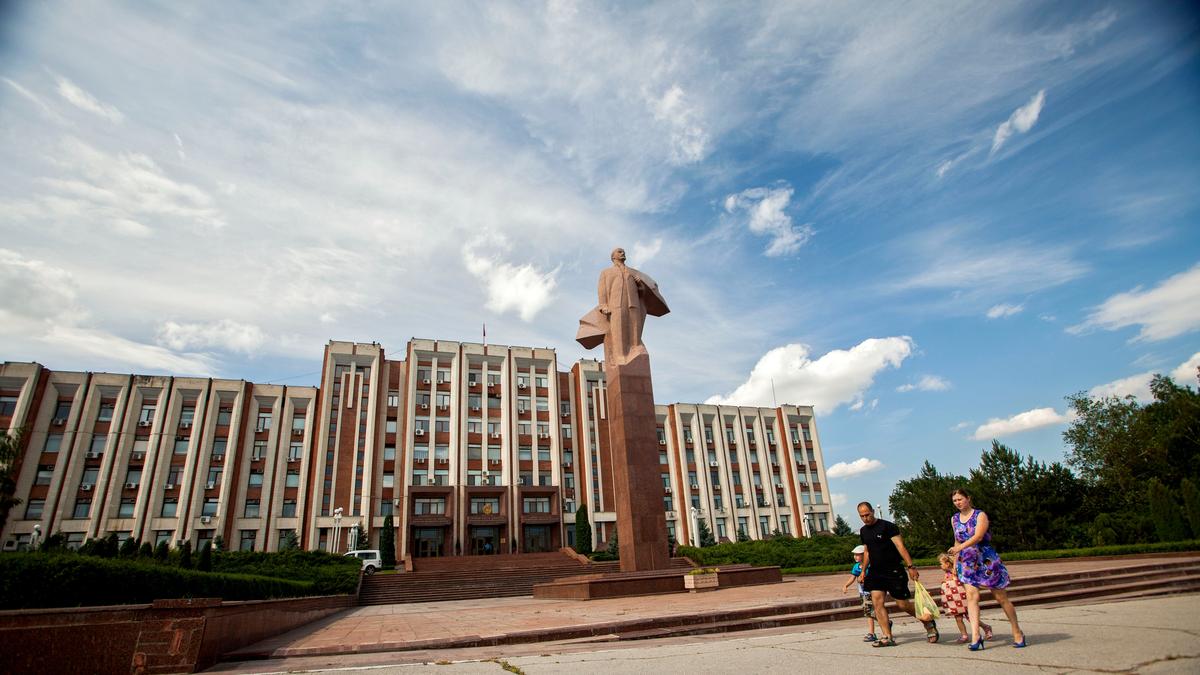As we enter the third year of Russia’s full-scale invasion of Ukraine and the 10th year of its occupation of Ukrainian territory, Transnistria has once again emerged as a strategic weapon in Russia’s arsenal for use against Ukraine, Moldova and Europe.

Olga Lautman
Senior Fellow at The Centre for European Policy Analysis
Transnistria, a breakaway region of Moldova situated on the Ukrainian border, is back in the spotlight following an appeal to Moscow issued by its unrecognised pro-Kremlin parliament for “protection” from what it called the mounting pressure Moldova was placing on it.
The appeal from Tiraspol set off alarm bells across Europe and was seen by some as an indicator of Russia’s intentions to further expand its territorial ambitions. The Russian military already has a base and 1,500 troops in the region, making its potential annexation a real possibility. Whether or not Russia has serious plans to annex Transnistria, one thing is certain: the appeal to Moscow was a key component of a covert attack orchestrated by Moscow against Chisinau.
“The Kremlin wants us to be scared, to be spineless, to be ruled by corrupt individuals and to be negotiated with by corrupt politicians, as has been the case for years,” Moldovan President Maia Sandu said in response, describing the recent action as another attempt to intimidate Moldovans and interfere in the presidential elections due in autumn. “We can’t let them do that.”
Beyond the immediate destabilisation that such calls bring about in Moldova, the move highlights a broader pattern of the Kremlin’s use of regional conflicts in neighbouring countries to serve its imperialistic agenda. Russia has a history of using regions it illegally occupies as leverage to sow discord, escalate tensions, and destabilise countries from within, just as it has done in Donbas in eastern Ukraine, as well as in South Ossetia and Abkhazia in Georgia.
The latest destabilisation attempt comes as Europe struggles to deter Russia’s aggression in Ukraine and to sound the alarm over the potential for an attack by Russia on a NATO country. As Europe finally begins to awaken to the grave danger Russia poses, Ukraine continues to bear a deadly burden, acting as a guardrail preventing war from spreading across the continent.
The ongoing operations against Moldova mirror Russia’s tactics in occupied regions of Georgia, where it has similarly fomented instability to assert dominance, destabilise the government in Tbilisi, and challenge Western influence. Moreover, its use of occupied territory, Crimea and Donbas, in Ukraine as a launchpad for the full-scale war in 2022 underscores Russia’s willingness to escalate conflicts and pursue its expansionist goals through military means.
Despite Russia’s agreement to withdraw its army from Transnistria in 1999, Russian troops remain stationed there, although most troops serving there are local ethnic Russians. While Transnistria’s dependence on Moscow is primarily economic and political rather than military, there are signs that Russia will use Transnistria to ramp up operations to influence the upcoming elections in Moldova and try to unseat Sandu, who has already announced she will stand for a second presidential term.
Moldova has long been subject to strategic manoeuvring on the part of big powers, but in recent years Russia has considerably intensified its pressure on the country and so understanding both the historical context and current geopolitical dynamics is essential to grasp the gravity of the situation and its implications for regional stability.
The defeat of pro-Russian incumbent Igor Dodon in Moldova’s 2020 presidential election marked a turning point for the country. This setback for Russian interests prompted a rapid and aggressive response from Moscow, which employed its tried and trusted tactics of disinformation and economic coercion, as well as operations aimed at destabilising Sandu’s new pro-Western government.
At the heart of the Kremlin’s strategy was Transnistria, and with Russia’s full-scale invasion of Ukraine, in early 2022, the threat posed to Moldova surged dramatically.
Exploiting its troop presence in Transnistria, Russia intensified pressure on Moldova and carried out destabilising operations. The parallels with Russia’s actions in Donbas were unmistakable, and it was no surprise that shortly after Putin’s unlawful decree to recognise Donbas as Russian territory in February 2022, Transnistria asked for similar recognition, though the Kremlin has yet to act on the request.
Meanwhile, attacks on the Moldovan government by Russian state media intensified culminating in hints that Russia could soon recognise Transnistrian independence, mirroring the run-up to Putin’s invasion of Ukraine. Viktor Vodolatsky, the deputy chairman of the State Duma’s Committee on CIS Affairs, labelled President Sandu a “Nazi” and hinted at the potential recognition of Transnistria to “combat Nazism,” echoing the lie used to launch the full-scale invasion of Ukraine. Pro-Kremlin voices insisted that Transnistria considered itself part of Russia, accusing Sandu and “her Romanian curators” of inciting conflict in the region. This was followed by a series of false flag attacks within Transnistria.
While Russia’s operations temporarily subsided, the plan to destabilise Moldova remained in place, along with a dedicated Russian intelligence team overseeing operations in the country.
In February 2023, the discovery of a Russian plot to overthrow Moldova’s pro-Western government reverberated through the international community, shedding yet more light on Russia’s deftness in hybrid warfare and influence operations. It was actually Ukrainian President Volodymyr Zelensky’s sharing of intercepted intelligence that revealed Moscow’s nefarious intent and underscored Russia’s brazen disregard for international norms in its relentless pursuit of strategic objectives through subversive means. Despite facing global condemnation and severe international sanctions, Russia has subsequently continued to engage in destabilising measures unabashed.
Moreover, Russia’s interference in Moldova is part of a broader pattern of malign operations aimed at undermining neighbouring states and challenging Western influence. From inciting Russian minorities to destabilise countries, attempting assassinations to meddling in referendums, and supporting far-right movements across Europe,
Russia consistently seeks to expand its sphere of influence at the expense of other country’s sovereignty and territorial integrity.
The recurrence of such tactics emphasises the urgent need for a unified and decisive response from the international community. Strengthening support for countries affected by Russian interference and aggression, bolstering defences against disinformation, and upholding the principles of sovereignty are crucial steps to safeguard regional stability.
It is crucial for Russia to be defeated in Ukraine, and to achieve this, the international community must ensure that Ukraine is equipped with all the necessary weapons and support. Providing Ukraine with the means to decisively win and reclaim all Ukrainian territory currently occupied by Russia is critical and vital for ensuring a peaceful future in Ukraine and for facilitating peace and stability in Europe.
Views expressed in opinion pieces do not necessarily reflect the position of Novaya Gazeta Europe.
Join us in rebuilding Novaya Gazeta Europe
The Russian government has banned independent media. We were forced to leave our country in order to keep doing our job, telling our readers about what is going on Russia, Ukraine and Europe.
We will continue fighting against warfare and dictatorship. We believe that freedom of speech is the most efficient antidote against tyranny. Support us financially to help us fight for peace and freedom.
By clicking the Support button, you agree to the processing of your personal data.
To cancel a regular donation, please write to [email protected]

